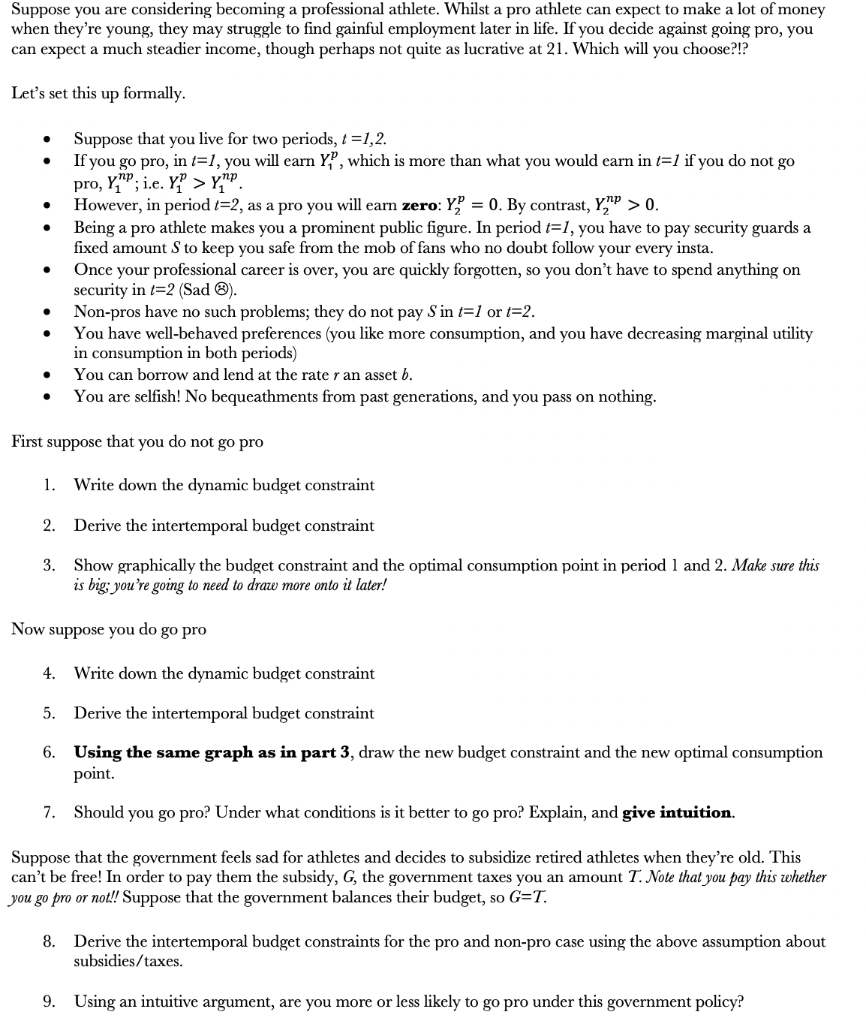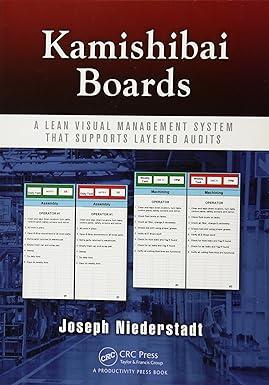All one question.. Please Help

Suppose you are considering becoming a professional athlete. Whilst a pro athlete can expect to make a lot of money when they're young, they may struggle to find gainful employment later in life. If you decide against going pro, you can expect a much steadier income, though perhaps not quite as lucrative at 21 . Which will you choose?!? Let's set this up formally. - Suppose that you live for two periods, t=1,2. - If you go pro, in t=1, you will earn Y1p, which is more than what you would earn in t=1 if you do not go pro, Y1np; i.e. Y1p>Y1np. - However, in period t=2, as a pro you will earn zero: Y2p=0. By contrast, Y2np>0. - Being a pro athlete makes you a prominent public figure. In period t=1, you have to pay security guards a fixed amount S to keep you safe from the mob of fans who no doubt follow your every insta. - Once your professional career is over, you are quickly forgotten, so you don't have to spend anything on security in t=2 (Sad :). - Non-pros have no such problems; they do not pay S in t=1 or t=2. - You have well-behaved preferences (you like more consumption, and you have decreasing marginal utility in consumption in both periods) - You can borrow and lend at the rate r an asset b. - You are selfish! No bequeathments from past generations, and you pass on nothing. First suppose that you do not go pro 1. Write down the dynamic budget constraint 2. Derive the intertemporal budget constraint 3. Show graphically the budget constraint and the optimal consumption point in period 1 and 2. Make sure this is big; you're going to need to draw more onto it later! Now suppose you do go pro 4. Write down the dynamic budget constraint 5. Derive the intertemporal budget constraint 6. Using the same graph as in part 3, draw the new budget constraint and the new optimal consumption point. 7. Should you go pro? Under what conditions is it better to go pro? Explain, and give intuition. Suppose that the government feels sad for athletes and decides to subsidize retired athletes when they're old. This can't be free! In order to pay them the subsidy, G, the government taxes you an amount T. Note that you pay this whether you go pro or not!! Suppose that the government balances their budget, so G=T. Suppose you are considering becoming a professional athlete. Whilst a pro athlete can expect to make a lot of money when they're young, they may struggle to find gainful employment later in life. If you decide against going pro, you can expect a much steadier income, though perhaps not quite as lucrative at 21 . Which will you choose?!? Let's set this up formally. - Suppose that you live for two periods, t=1,2. - If you go pro, in t=1, you will earn Y1p, which is more than what you would earn in t=1 if you do not go pro, Y1np; i.e. Y1p>Y1np. - However, in period t=2, as a pro you will earn zero: Y2p=0. By contrast, Y2np>0. - Being a pro athlete makes you a prominent public figure. In period t=1, you have to pay security guards a fixed amount S to keep you safe from the mob of fans who no doubt follow your every insta. - Once your professional career is over, you are quickly forgotten, so you don't have to spend anything on security in t=2 (Sad :). - Non-pros have no such problems; they do not pay S in t=1 or t=2. - You have well-behaved preferences (you like more consumption, and you have decreasing marginal utility in consumption in both periods) - You can borrow and lend at the rate r an asset b. - You are selfish! No bequeathments from past generations, and you pass on nothing. First suppose that you do not go pro 1. Write down the dynamic budget constraint 2. Derive the intertemporal budget constraint 3. Show graphically the budget constraint and the optimal consumption point in period 1 and 2. Make sure this is big; you're going to need to draw more onto it later! Now suppose you do go pro 4. Write down the dynamic budget constraint 5. Derive the intertemporal budget constraint 6. Using the same graph as in part 3, draw the new budget constraint and the new optimal consumption point. 7. Should you go pro? Under what conditions is it better to go pro? Explain, and give intuition. Suppose that the government feels sad for athletes and decides to subsidize retired athletes when they're old. This can't be free! In order to pay them the subsidy, G, the government taxes you an amount T. Note that you pay this whether you go pro or not!! Suppose that the government balances their budget, so G=T







